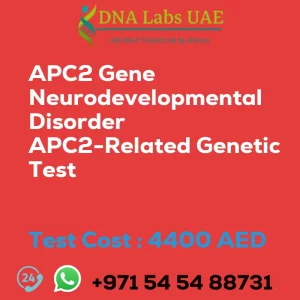MT-TV Gene Neonatal Death Due to Leigh Syndrome MT-TV Related Genetic Test
At DNA Labs UAE, we offer the MT-TV Gene Neonatal Death Due to Leigh Syndrome MT-TV Related Genetic Test. This test is designed to diagnose Leigh syndrome, a rare genetic disorder characterized by progressive neurological deterioration that typically appears in infancy or early childhood.
Test Components
- Price: 4400.0 AED
- Sample Condition: Blood or Extracted DNA or One drop Blood on FTA Card
- Report Delivery: 3 to 4 Weeks
- Method: NGS Technology
- Test Type: Neurological Disorders
- Doctor: Neurologist
- Test Department: Genetics
Pre Test Information
Prior to undergoing the MT-TV Gene Neonatal Death Due to Leigh Syndrome MT-TV Related Genetic Test, it is important to provide the clinical history of the patient. Additionally, a genetic counseling session will be conducted to draw a pedigree chart of family members affected by MT-TV Gene Neonatal Death Due to Leigh Syndrome MT-TV Related.
Test Details
The MT-TV gene is associated with Leigh syndrome, a severe genetic disorder that causes progressive neurological deterioration. Neonatal death due to Leigh syndrome refers to the unfortunate outcome of the disorder occurring within the first few weeks or months of life. Our NGS genetic testing method allows for the simultaneous analysis of multiple genes, including the MT-TV gene, to identify mutations or variations associated with Leigh syndrome.
To perform the test, a DNA sample is required, usually obtained through a blood sample. The DNA is then sequenced using NGS technology, comparing the sequencing data to a reference genome to identify any mutations or variations in the MT-TV gene or other relevant genes associated with Leigh syndrome.
The results of the NGS genetic test can confirm a diagnosis of Leigh syndrome, providing valuable information for genetic counseling, family planning, and potential treatment options. It is important to note that while genetic testing can be helpful, it may not always provide definitive answers or a cure for the condition.
| Test Name | MT-TV Gene Neonatal death due Leigh syndrome MT-TV related Genetic Test |
|---|---|
| Components | |
| Price | 4400.0 AED |
| Sample Condition | Blood or Extracted DNA or One drop Blood on FTA Card o |
| Report Delivery | 3 to 4 Weeks |
| Method | NGS Technology |
| Test type | Neurological Disorders |
| Doctor | Neurologist |
| Test Department: | Genetics |
| Pre Test Information | Clinical History of Patient who is going for MT-TV Gene Neonatal death due Leigh syndrome, MT-TV related NGS Genetic DNA Test A Genetic Counselling session to draw a pedigree chart of family members affected with MT-TV Gene Neonatal death due Leigh syndrome, MT-TV related |
| Test Details |
MT-TV gene is associated with a rare genetic disorder called Leigh syndrome, which is characterized by progressive neurological deterioration typically appearing in infancy or early childhood. Leigh syndrome is caused by mutations in mitochondrial genes, including the MT-TV gene. Neonatal death due to Leigh syndrome refers to the unfortunate outcome of the disorder occurring in the first few weeks or months of life. It is a severe form of the disease with rapid progression and poor prognosis. NGS (Next-Generation Sequencing) genetic testing is a technique used to analyze multiple genes simultaneously and identify mutations or variations that may be associated with a particular disorder. In the case of Leigh syndrome, an NGS genetic test can help identify mutations in the MT-TV gene or other mitochondrial genes, providing a diagnosis for the condition. This genetic test involves obtaining a DNA sample, usually through a blood sample, from the individual being tested. The DNA is then sequenced using NGS technology, which allows for the simultaneous analysis of multiple genes. The sequencing data is then compared to a reference genome to identify any mutations or variations in the MT-TV gene or other relevant genes associated with Leigh syndrome. The results of the NGS genetic test can help confirm a diagnosis of Leigh syndrome and provide valuable information for genetic counseling, family planning, and potential treatment options. It is important to note that while genetic testing can be helpful, it may not always provide definitive answers or a cure for the condition. |








